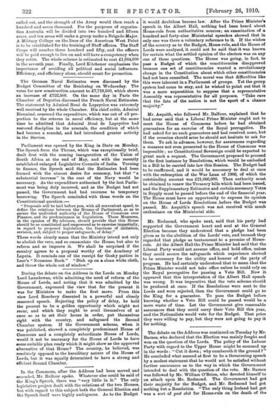In the Commons, after the Address had been moved and
seconded, Mr. Balfour spoke. Whatever else could be said of the King's Speech, there was "very little in it." The only legislative project dealt with the relations of the two Houses, but with regard to this subject both the General Election and the Speech itself were highly ambiguous. As to the Budget
it would doubtless become law. After the Prime Minister's speech in the Albert Hall, nothing had been heard about Home-rule from authoritative sources; an examination of a hundred and forty-nine Ministerial speeches showed that in only one was there a voluntary reference to it. If the wishes of the country as to the Budget, Home-rule, and the House of Lords were analysed, it could not be said that it was known for certain what the settled opinion of the electors was on any one of those questions. The House was going, in fact, to pass a Budget of which the constituencies disapproved because one set of constituencies wanted a revolutionary change in the Constitution about which other constituencies had not been consulted. The moral was that difficulties like this were inherent in a Parliament of groups. Yet the group system had come to stay, and he wished to point out that it was a mere superstition to suppose that a representative Assembly was representative for all purposes. "Take care that the fate of the nation is not the sport of a chance majority."










































 Previous page
Previous page